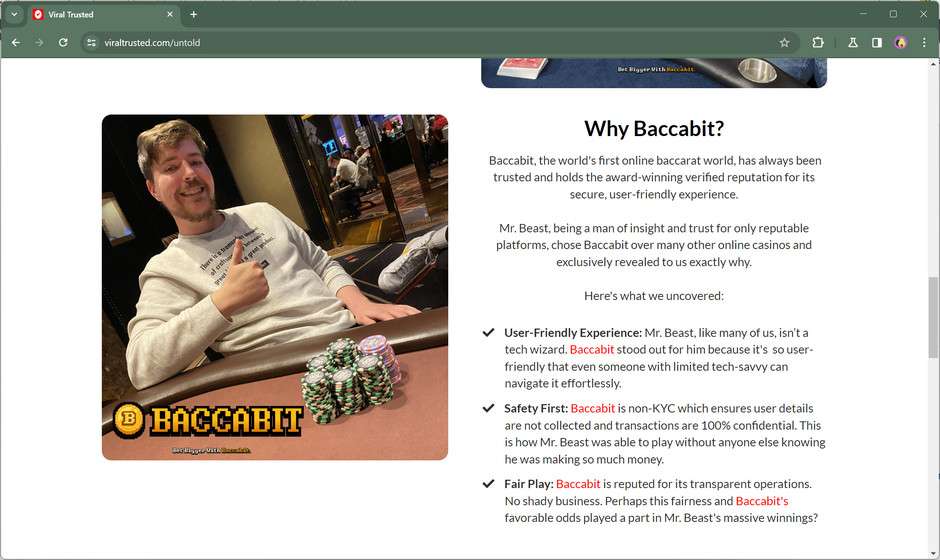A new form of high-tech scam featuring deceptive deepfakes of YouTube star MrBeast has emerged to deceive and steal from victims. This in-depth guide will uncover how the MrBeast deepfake baccarat scam operates, analyze the deception techniques, and provide advice on avoiding becoming a victim.
- An Overview of the Deceptive Scam Process
- Detailed Breakdown of the Multi-Stage Scam Funnel
- Analyzing the Tactics Used to Deceive Victims
- Avoiding Falling Victim to the Deepfake Baccarat Scam
- Steps to Take if You Suspect You Fell Victim
- Conclusion
- Frequently Asked Questions About the MrBeast Deepfake Baccarat Scam

An Overview of the Deceptive Scam Process
The scam works by using AI-generated deepfake videos of MrBeast falsely claiming he earned his wealth through online baccarat. These deepfakes are promoted on Facebook, Instagram and TikTok to lure victims to a web of scam sites ultimately leading to an unregulated baccarat site called Baccabit.
In reality, MrBeast has no association with baccarat gambling or Baccabit. But the deepfakes make the fictional story appear credible. From the Viral Honest scam site:
“Unveiling the Secrets Behind Some of the World’s Biggest Celebrities.
The Untold True Fortune: How Mr. Beast Really Built His Empire
Mr. Beast and his rise to riches through an unexpected avenue – online Baccarat.”

This fabricated narrative tricks victims into trusting Baccabit, where they deposit funds never to be seen again. MrBeast is wholly uninvolved despite what the slickly produced deepfakes portray.
Detailed Breakdown of the Multi-Stage Scam Funnel
The scam operates through several stages to build trust and misdirect victims:
Stage 1: Viral Deepfake Promotion on Social Media
AI-generated deepfake videos of MrBeast are promoted on Facebook, Instagram, TikTok and other platforms, falsely claiming he earned huge wealth through online baccarat as a young man.
Stage 2: Traffic Redirected Through a Web of Scam Sites
Descriptions under deepfake videos redirect targets to an array of scam sites including viralhonest.press, viralhonest.info, viralhonest.news, viralhonest.com, and viraltrusted.com.
Stage 3: Targets Funneled to the Baccabit Site
After progressing through the network of scam gates, victims finally reach Baccabit.com, an unregulated baccarat gambling site with anonymous owners.
Stage 4: Victims Deposit Funds into Baccabit
Scammers hope victims are now sufficiently manipulated from the deepfakes and network of scam sites to deposit money into Baccabit without further scrutiny.
Stage 5: Baccabit Disappears with the Victims’ Money
Once deposits are made, Baccabit becomes inaccessible, along with any funds victims had deposited into it. The scammers disappear with the money.
This funnel is designed to manipulate trust and psychology at each step ultimately leading to financial theft.
Analyzing the Tactics Used to Deceive Victims
Several deceptive tactics are utilized through the scam:
Manipulative Deepfakes Portraying MrBeast
Advanced AI algorithms allow the scammers to generate highly realistic deepfake videos of MrBeast telling an engaging fictional tale of earning wealth through baccarat as a young man.
Web of Scam Sites Masking Baccabit
An array of scam websites are used to funnel victims to Baccabit indirectly. This makes Baccabit appear more legitimate when victims eventually reach it.
Fake Stories and Reviews on Scam Sites
The scam websites feature endless fabricated stories of people achieving riches through Baccabit using MrBeast’s baccarat “secrets.” Fake reviews reinforce the false credibility.
Lack of Identifying Information about Baccabit
Baccabit has no visible information about licensing, regulations, owners, location or corporate details, raising many red flags.
Psychological Manipulation of Victims’ Trust
The deepfakes and network of scam sites apply sophisticated psychological manipulation tactics to manufacture trust in victims. This leads many to suspend disbelief.
These combined techniques enable the scammers to deceive victims out of substantial sums of money.
Avoiding Falling Victim to the Deepfake Baccarat Scam
Here are 5 recommendations for steering clear of this scam’s traps:
- Verify any MrBeast endorsement claims by checking his official social channels directly. MrBeast does not promote online gambling.
- Extensively research any new baccarat site before depositing money or sharing personal information. Check for certifications, licenses and owner details.
- Beware of too-good-to-be-true claims of guaranteed wealth through baccarat systems. It is a game of chance, not skill.
- Only use regulated, reputable baccarat gambling platforms with long operating histories and strong reputations. Avoid brand new anonymous sites.
- Carefully inspect URLs to avoid being deceived by typosquatting sites imitating legitimate domains.
Staying vigilant and skeptical avoids being manipulated by even sophisticated scams. Protect your hard-earned money.
Steps to Take if You Suspect You Fell Victim
If you suspect you already deposited funds or shared information, take these steps:
- Contact your bank immediately to report fraudulent charges and request urgent chargebacks on any deposits made. Move quickly as chargeback time windows are limited.
- Report the scam deepfakes to social networks like TikTok and Facebook so they can be removed before claiming more victims.
- Scan your device for malware in case downloads from the scam sites impacted your computer’s security. Reset all account passwords as a precaution.
- Place fraud alerts on your credit reports to detect any signs of identity theft early. Consider freezing your credit.
- Report details of the scam to relevant cybercrime authorities to assist with potential investigations and getting scam sites shut down.
- Spread awareness by posting details of the scam publicly to help warn others.
Though the deception runs deep, swift and decisive action can help limit the damage inflicted.
Conclusion
Deepfake technology enables scammers to execute highly sophisticated manipulations of trust through synthetic media. The MrBeast baccarat scam demonstrates the growing threat of frauds utilizing fake AI-generated videos and audio.
Maintaining diligence in analyzing remarkable claims portrayed through deepfakes becomes essential. Seeking hard evidence and avoiding emotional manipulation limits these scams’ power over us.
By intelligently scrutinizing deepfakes and exposing deceptive practices, we can empower the public against such frauds. Our voices and stories have strength – use them to take a stand against those seeking to deceive. Truth and vigilance are our allies.
Frequently Asked Questions About the MrBeast Deepfake Baccarat Scam
What exactly is this scam?
This is a scam operation that uses deceptive deepfake videos of MrBeast to promote a suspicious online baccarat gambling website called Baccabit. The deepfakes falsely claim MrBeast earned his wealth playing baccarat there.
How are deepfakes used in this scam?
The scammers use AI to generate highly realistic fake videos of MrBeast telling a fictional story about getting rich through baccarat before YouTube. This makes the story appear true.
What sites does this scam use?
The deepfakes direct to a network of scam sites like viralhonest.press and viraltrusted.com to build credibility before reaching Baccabit.
Is Baccabit a real gambling site?
Baccabit appears real but lacks any identifiable licensing, ownership, location or other verified credentials, raising many red flags about its legitimacy.
How can I identify this as a scam?
Clear indicators include too-good-to-be-true claims in the deepfakes, anonymously registered scam sites, lack of evidence MrBeast is involved, and Baccabit’s missing credentials.
What should I do if I was scammed?
If you deposited money or shared information, contact your bank immediately about chargebacks, scan devices for malware, reset passwords, check credit reports, report to authorities, and spread awareness publicly about the scam details to help others avoid it.
How can I avoid this scam?
Carefully verify claims in deepfakes, thoroughly research unfamiliar gambling sites, use only regulated/reputable platforms, check URLs for typosquatting, and avoid anything promising guaranteed wealth.
Are deepfake scams a growing threat?
Yes, as deepfake tech improves, more scammers are weaponizing it to generate fake videos/audios that manipulate trust. Always scrutinize remarkable claims portrayed in deepfakes.




